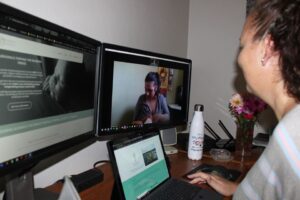
Preventing Decay with Fluoride
What is fluoride (flor-ahyd)?
Fluoride is a mineral that is naturally present in different amounts in almost all foods and water. Fluoride is also used in many dental products such as toothpaste and mouth rinses.
How does fluoride help stop cavities?
Fluoride works in two ways: topically and systemically. Topical fluorides (meaning fluoride put right on the teeth) strengthen teeth that are in the mouth. As fluoride washes over the tooth surface, it is added into the outer surface of the tooth, making it stronger which protects teeth from cavities. Topical fluoride also helps protect and make the root surfaces less sensitive by adding fluoride into the naturally occurring “softer” root surface.
Systemic fluorides are those that are swallowed via food and water and are used by the body when the teeth are forming. If fluoride is taken regularly during the time when teeth are forming (6 months to 6 years-old), it will be added into the enamel layer (outer layer of the tooth) as they develop, creating a stronger, more cavity resistant tooth. Systemic fluorides also protect teeth topically; fluoride is in saliva, which is always washing over the teeth. Fluoride can help the tooth repair itself where it may have been damaged by acids early in the cavity process.
How can I get fluoride?
Topical fluoride comes from toothpaste, mouth rinses, gels, and varnishes which are placed directly on the teeth. Children are usually provided with topical fluoride at their dental checkups. Topical fluoride is one of the best ways to get fluoride to teeth. If you or your child has cavities or teeth that are sensitive to cold, your CDA member dentist may give you a product that has more fluoride than products you buy at the store.
Systemic fluoride is available by drinking tap water that either has naturally occurring fluoride or has had fluoride added to help fight cavities. In communities without fluoridated water, people can
purchase bottled water that has fluoride or your CDA dentist or your child’s pediatrician can prescribe fluoride tablets or vitamins. Remember, the fluoride must be swallowed to have systemic effects.
Who benefits from fluoride?
Everyone can benefit from fluoride’s ability to help stop cavities. Almost 60% of people living in California have fluoridated drinking water. If your community is considering fluoridating its water supply, supporting these efforts helps not only you and your children, but everyone in the community.
If some fluoride is good, is more fluoride better?
The benefits of fluoride have been well known for over 60 years and are supported by many health and professional organizations, including the California Dental Association, the American Dental Association, The American Medical Association, the United States Centers for Disease Control and Prevention, the U.S. Public Health Service and the World Health Organization.
However, as with all substances we swallow, there are safe levels, levels that are the best for our overall health, and levels that are not good. When too much fluoride is taken, a condition called dental fluorosis can result. While dental fluorosis is not harmful, it can cause your child’s teeth to have brown or white spots.
Parents should be aware of the sources of systemic fluoride. If your community water supply is fluoridated at “optimal” or the perfect level to help prevent cavities, then your children should not take fluoride tablets or fluoride vitamins. Additionally, young children (those who cannot spit after brushing their teeth) should only use a small, pea-sized amount of fluoride toothpaste so that they do not swallow too much fluoride.
What to remember?
Fluoride alone will not prevent cavities; it is only one part of what is needed for strong teeth and good oral health. Brush your teeth at least twice a day with a fluoridated toothpaste, floss daily, eat a balanced diet, and limit how often you snack in between meals, especially on sweet and sticky foods. Visit your CDA member dentist regularly.
https://gatewaytucson.com/wp-content/uploads/2020/05/fluoride_english.pdf
For information specific to fluoride usage in our community, feel free to contact Margarete Perry (520) 724-7902 at the Pima County Health Department’s First Smiles Matter program, to schedule a meeting or lunch and Learn for medical and dental professionals.

